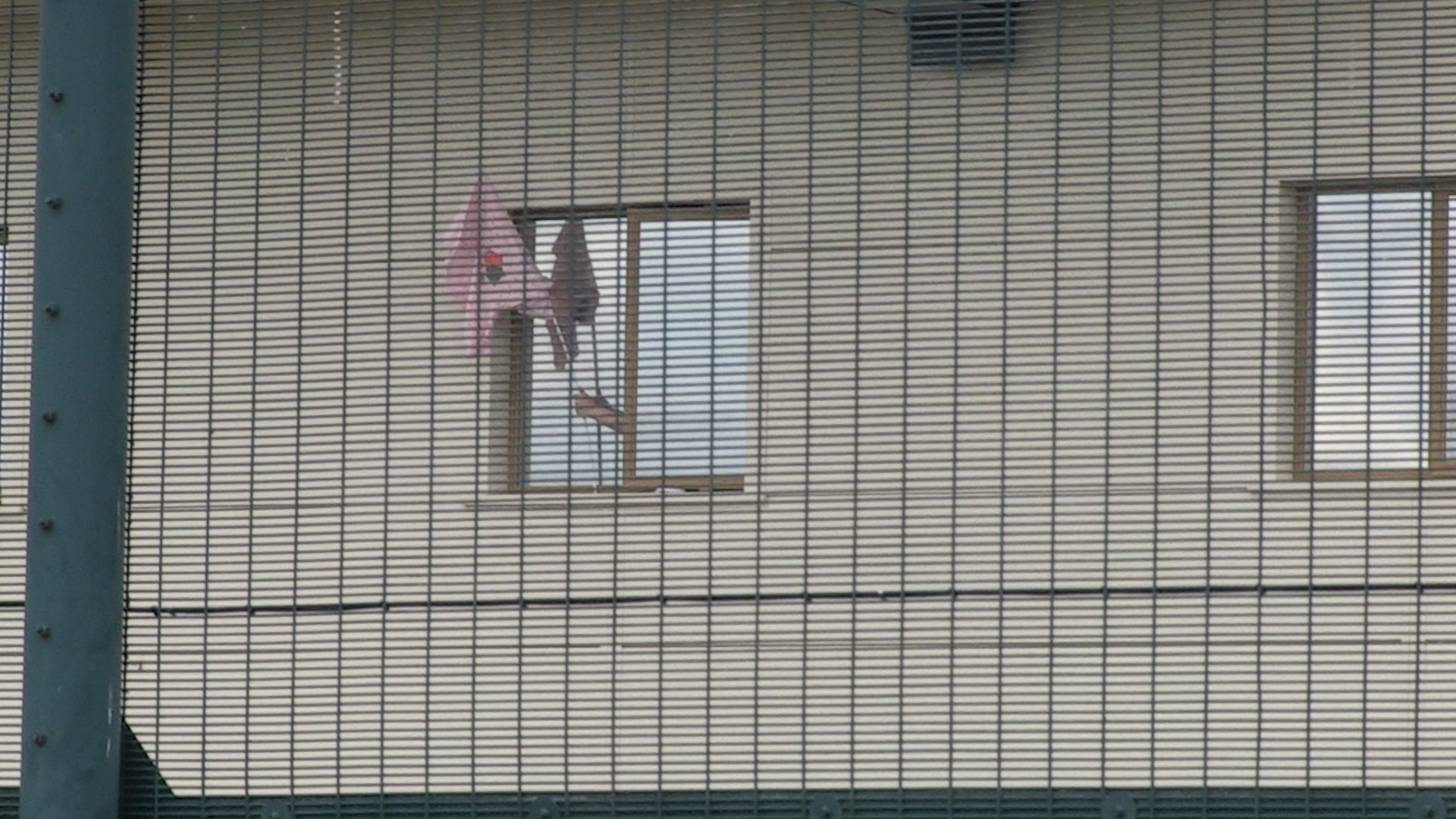"Where I'm from, trans people are discriminated against and face persecution," says Anika*, a 37-year-old transgender asylum seeker from India."We get killed because we are different, and are subjected to constant harassment and abuse. People don't want to rent a house to you and you can't get a job. We are not able to survive."After Anika's parents discovered she was trans, she fled to the UK and applied for asylum in 2014. Anika was one of 13,636 to be put into indefinite detention that year while the UK government processed her case.
Advertisement
Seeking asylum is a right enshrined in the Universal Declaration of Human Rights. Yet over the past 20 years the scale of immigration detention in the UK has expanded. The UK now has amongst the largest immigration detention facilities in Europe, according to Oxford-based research institute The Migration Observatory. Last year, 28,900 people were detained by the Home Office. Although the majority of detainees are held for under a month, in some cases individuals have been held for over a year.LGBTQ asylum seekers are falling between the cracks of an overloaded and unfeeling detention system. According to a 2010 survey of 50 failed asylum requests from charity the UK Lesbian and Gay Immigration Group (UKLGIG), as many as 99 percent of gay and lesbian asylum seekers were sent back to countries with poor records on LGBTQ rights, such as Iran and Uganda. In some cases, people were simply told to be "discreet."The UK government doesn't publish precise statistics on LGBTQ asylum requests, so it's impossible to know how many people may have been sent back to countries that are unsafe for queer people. In 2017, the Home Office released partial figures showing that at least 76 LGBTQ people were detained in English detention centers in 2016. However, the figures provided were incomplete, and it's likely the scale of LGBTQ detention is higher."A country cannot credibly claim to be a global leader on LGBT rights while it continues to subject LGBT people fleeing persecution to discrimination and indefinite detention," says Paul Dillane of LGBTQ nonprofit Kaleidoscope Trust. He highlights how representatives of all political parties in the UK have condemned Chechnya's human rights abuses against gay men, while staying complicit in the imprisonment of innocent and vulnerable LGBTQ asylum seekers, including those fleeing from Russia.
Advertisement
Anika was first detained by the Home Office (the government department responsible for immigration) in July 2014 for two weeks. After her claim was rejected, she appealed and was detained for a second time in January 2015 for four months.In total, Anika was transferred between five detention centres—always detained in all-male units—despite receiving written confirmation from the Home Office that she was considered female prior to her second period of detention. Anika claims to have notified staff at every detention center of her gender identity, but was strip-searched by male employees each time she moved.
Watch Yarl's Wood: Shut It Down!
Before entering detention Anika was due to have eye-surgery, which eventually had to be cancelled. Even more alarmingly, although she had been taking hormones for 18 months prior to detention, there was little effort from staff to understand her medical history."When I first arrived in detention at Dungavel [a detention center in Scotland, where she stayed in July 2014], I told them I can't stop taking my hormones all of a sudden, so I need some kind of bridging hormones," Anika recalls. "The nurse completely ignored this and didn't give me anything. I started growing darker hair all over my body. This delayed my transition and was extremely distressing."After requesting to be moved, Anika was transferred to Pennine House, a Manchester-based removal center. She claims that, despite her objections, she was moved into a shared room with three men.
Watch Yarl's Wood: Shut It Down!

Before entering detention Anika was due to have eye-surgery, which eventually had to be cancelled. Even more alarmingly, although she had been taking hormones for 18 months prior to detention, there was little effort from staff to understand her medical history."When I first arrived in detention at Dungavel [a detention center in Scotland, where she stayed in July 2014], I told them I can't stop taking my hormones all of a sudden, so I need some kind of bridging hormones," Anika recalls. "The nurse completely ignored this and didn't give me anything. I started growing darker hair all over my body. This delayed my transition and was extremely distressing."After requesting to be moved, Anika was transferred to Pennine House, a Manchester-based removal center. She claims that, despite her objections, she was moved into a shared room with three men.
Advertisement
"It was awful. It was so difficult to share a room with male strangers, especially in my position." The following afternoon Anika was moved at her own request to Colnbrook Immigration Removal Centre (IRC), a detention centre on the outskirts of London. At Colnbrook, she spent over a week in an all-male isolation unit before being released. Although her cell had its own toilet, Anika says she was only permitted to leave for two hours at a time."Healthcare in all immigration detention facilities in England is commissioned by NHS England. Primary healthcare, including access to medication, is provided in all immigration removal centres which is equivalent to that available in the community," said a Home Office spokesperson. "We operate a comprehensive complaints system for anyone who feels they have not been treated in accordance with our standards and all complaints are investigated thoroughly.""Immigration detention cannot ensure safety and dignity for LGBTI asylum seekers," says Leila Zadeh of UKLGIG. "They often have to chose between self-isolation and denying who they are. Trans detainees are often segregated in isolation for their protection and that responses to their medical needs are inadequate."
During her second period of detention, Anika spent just over two weeks at Harmondsworth IRC in February 2015. She alleges staff there addressed her using male pronouns and gave her male clothes. As Anika had developed breasts following hormone therapy, the all-male units communal showers were a terrifying prospect. As a result, Anika was unable to shower for 15 days while a transfer was arranged to a detention centre that has private showers, in this case Colnbrook IRC.Read more: Raped, Threatened, and Left to Die: How the US Fails Female Asylum Seekers
Advertisement
"I was constantly pleading with them to move me to a different room, even writing letters to the head of the centre," Anika recalls. "It was humiliating."Trans people at an elevated risk of abuse when being held in detention, according to a 2016 report from UKLGIG and LGBT charity Stonewall.Feeling like an outsider in detention can bring back traumatic memories for LGBTQ asylum seekers who have faced rejection throughout their lives. "People are always giving you weird looks, laughing at you, or harassing you for being different. The other detainees used to try to touch me and rub my breasts," Anika says. "I was being abused by other people for being different all over again, which is why I fled my country. It was like being back to square one."
The Home Office, which processes asylum claims. Photo via Flickr user Steve Cadman
Being confined indefinitely is immensely traumatizing—especially when you're being kept in solitary confinement. After arriving back at Colnbrook, Anika was moved into the Auxiliary Support Unit (ASU), which houses serious criminals and detainees deemed to be a suicide risk. Like Harmondsworth, the ASU in Colnbrook had communal showers, and it took a further five days for her to be transferred into a room with a private shower and toilet."I was having suicidal thoughts from being isolated. I was barely allowed out of my room," Anika recalls. "In isolation people would bang on the doors so loudly that it stopped me from sleeping. I can still hear the noises."
Advertisement
Saqib, a 24 year-old gay asylum seeker from Bangladesh, applied for asylum in London in May 2015. He was taken to Harmondsworth detention center on the outskirts of London. "The first night I was in a room alone. I was crying all night because I was so scared. It was very emotional for me. I kept thinking, What have I done to end up in this cell?"In addition to the profoundly isolating experience of being in detention, many asylum seekers are cut off from the outside world—forced to exist in an information vacuum. Both Anika and Saqib tell me that many websites mentioning LGBTQ people are blocked within detention centres, making it even harder for them to access support. (The government has acknowledged that broad categories of websites are blocked within centers.)After fleeing from Bangladesh to escape constant threats of violence from his own family, Saqib was shocked to find himself detained alongside serious criminals. The lack of privacy in detention meant that he was too scared to write a personal statement for fear of it being discovered by a fellow detainee, hampering his ability to prepare for court.Saqib's experience as a vulnerable gay man is not unique. In 2014, VICE News reported that a gay asylum seeker was forced to sleep on the kitchen floor for five months out of fear of sharing a room with a violent homophobe. In 2016, a British MP told parliament that a private contractor had housed an LGBTQ refugee in a single bedroom with a former member of the Taliban.
Advertisement
LGBTQ asylum cases are also more likely to be processed incorrectly. A 2014 investigation into the Home Office's handling of asylum claims found evidence of stereotyping in about a fifth of cases. Cases being held under Detained Fast Track —a system that was found to be unlawful after giving claimants just days to prepare their case—were twice as likely to include questions of an "unsatisfactory nature," for example asking applicants about sexually explicit details of their personal lives.When a person claims asylum, they ask for our protection and support—sometimes from their own families and communities. Indefinite immigration detention not only hinders ability of LGBTQ asylum seekers to recover from persecution, but gives the impression that they are once again being punished for their sexuality or gender identity.
Two years on, Saqib's case—like Anika's—remains ongoing. As he lives in the community waiting to find out whether he'll be able to stay in the UK, Saqib grows isolated. Since being detained he has also become fearful of strangers and now suffers from insomnia."You can't work, you can't plan and you can't earn money or have independence. You can't have a life. I feel like everyone else is going forward and I'm stuck in one place."In my final question to Saqib, I asked him about his hopes for the future. His response is a brutal reminder of the lasting damage that such indefinite detention can cause. "I've lost my hope. At this moment I don't have any plans or any dreams. If I plan today, then I will be disappointed tomorrow."*Names have been changed.
